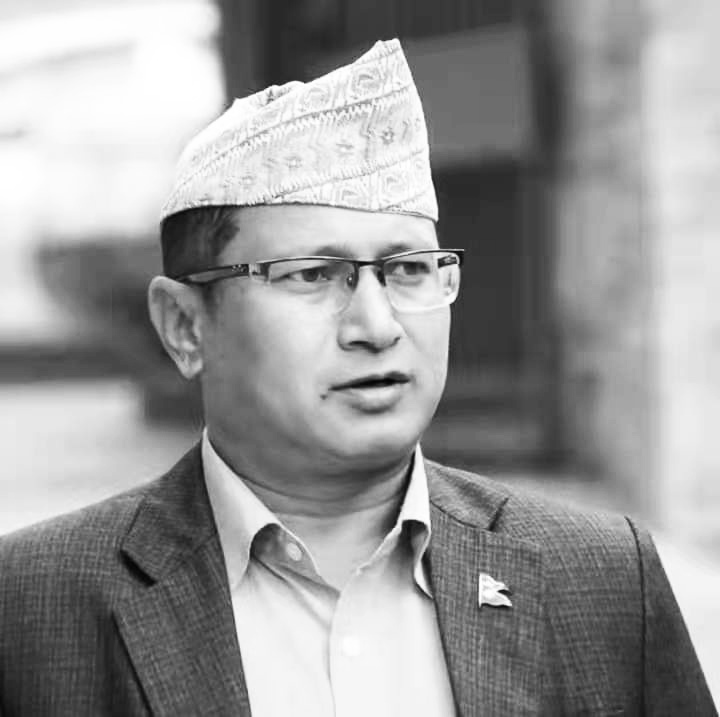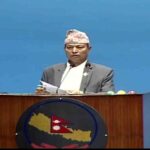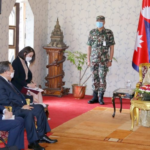# Prem Sagar Poudel
If not consider coincidental, July 13 was an important day for Nepali scholars. The same day was the birthday of the first poet Bhanubhakta Acharya. On the other hand, Guru Purnima also had the same day. It was another coincidence that Liu Jianchao, the visiting Foreign Minister of the Communist Party of China, met Narayan Man Bijukchhe, the Chairman of the Nepal Workers’ and Peasants’ Party (Nepal Mazdoor Kisan Party), who has always stood by the Chinese side in Nepal. Earlier, Bijukche was not on the list of the Chinese team visiting Nepal.
The six-member team of the head of the International Liaison Department of the Chinese Communist Party Liu, who is on a 4-day visit to Nepal, was given a grand welcome in Bhaktapur. This reception from the public has an important meaning in itself. NMKP leader and Mayor of Bhaktapur Municipality Sunil Prajapati put Bhadgaunle Topi to the Chinese team. He welcomed the Chinese team at the entrance of Durbar Square. The local people participated in the reception with local cultural bands and dances. The Chinese leader was visited around the palace area with leaders Bijukchhe, Chairman of the Nepal Workers’ Pesants’ Party.
The Chinese leaders visited Durbar Square and Toumdhi area for an hour to observe the heritage. On the occasion, Chinese leader Liu expressed happiness over the reconstruction of Durbar Square and Toumdhi area damaged by the earthquake at Nepal’s own expense. There was also a message that Nepal could do something if it wanted to. In other words, if we can invest in such projects, it means that the investment made in Nepal will not be wasted. After an hour-long observation visit, International Liaison Department Chief Liu had a half-hour meeting with President Bijukchhe.
Covered the truth:
In the meeting with the visiting Chinese team, all the Nepali leaders have worked to block the truth. During the last meeting of the visit, Chairman Bijukchhe also covered the truth. He said, “Nepal is committed to the one-China policy.” While Chairman Bijukchhe was saying this, the issue of the one-China policy of the government questioned by his secretary Prem Suwal in the parliament some time ago was overshadowed.
In the last one year, namely after the formation of the government under the leadership of Sher Bahadur Deuba, Nepal has become like a football ground for anti-Chinese players. After passing the MCC, the Americans seem to be excited with the thought that something can be done in Nepal. Especially after US Deputy Secretary of State Uzra Zeya visited the Tibetan refugee camp during her visit to Nepal, it became clear what America wants from Nepal. Meanwhile, the government withdrew the Budhi Gandaki hydropower project from the Chinese company Gejuwa Group of China. Despite the government’s decision to move the project forward oneself, Prime Minister Deuba wished to hand over the project to visiting Indian Prime Minister Narendra Modi in Lumbini.
On the day of Buddha Purnima, the Indian Prime Minister Modi, who is on a religious visit, is yet to be confirmed about the wish that Nepal’s Prime Minister Deuba wants to hand over. China earlier expressed displeasure over the cancellation of the Budhigandaki project already handed over to a Chinese contractor. In a virtual press meet organized by the Chinese Embassy in Kathmandu on May 22, 2022, Chinese Ambassador to Nepal Hou Yanqi said, “Stakeholders also have to prepare for a long time to invest in big projects for Nepal, because all the efforts have been in vain due to repeated changes in the government’s policy.”
However, none of these issues came up for discussion during the visit of Liu, the head of the International Liaison Department of the Chinese Communist Party in Nepal. Most of the leaders showed their old verbal stance in favor of the One China Policy. Even Minister Pampha Bhusal, who is preparing the file for the cancellation of the Budhigandaki Hydropower Project from Gejuwa as a departmental minister, welcomed Liu, the International Liaison Department of the Chinese Communist Party, staying in the line of the negotiating team of the Maoists.
All are equal:
This visit of the head of the International Liaison Department Liu has given some meaning. That is, “all parties in Nepal are equal to China.” Nepali Congress was not China’s priority in previous visits. During the tenure of the NCP, the NCP was the first priority due to its sisterly relationship with the CPC. However, the visit of the head of the International Liaison Department Liu seems to have broken the belief that China is close to the Communists, which has been in Nepal for a long time.
On behalf of the Nepali Congress, Dinesh Bhattarai, the former foreign advisor of Prime Minister Sher Bahadur Deuba, was present there to welcome the visiting party of the head of the International Liaison Department Liu at Tribhuvan International Airport. On behalf of the main opposition party UML, the head of foreign affairs department Rajan Bhattarai was there. Ram Karki, a member of the Politburo of the Maoist Centre, another partner of allignment, was present. Apart from this, Revati Raman Poudel, the Deputy Chief of Protocol (Deputy Secretary level staff) of the Ministry of Foreign Affairs reached the airport for the welcome.
The visit seems to be both political and official as it was welcomed by the party representatives as well as the government representatives. In addition, the welcome by the Nepali Congress leader during the visit of the Chinese Communist Party leader to Nepal had not been seen before. Therefore, it was clear from the airport that this visit has a special significance. On the other hand, Foreign Minister Narayan Khadka, who is also a member of the Congress Central Committee, hosted a dinner for the visiting Chinese leaders at Hotel Marriott on July 10. The banquet was not on behalf of the government but on behalf of the Nepali Congress Central Committee.
After the meeting with Prime Minister Deuba, the Chinese delegation attended the dinner. The Chinese leader began his formal meeting with Foreign Minister Khadka. The meeting also focused on party relations rather than at the government level. This visit seems to have conveyed the message that China views all parties of Nepal equally in recent times. The basis for this was prepared by Liu, the head of the International Liaison Department. After being appointed as the head of the International Liaison Department, Liu had a virtual conversation with the Maoist Chairman Pushpa Kamal Dahal on June 23. On June 24, after a virtual conversation with UML Chairman KP Oli, Liu had a video conversation with Foreign Minister Dr. Narayan Khadka, who is also a central member of Congress. In a conversation with Khadka, Chinese leader Liu said that the Chinese Communist Party wants to strengthen relations with all parties in Nepal. After this dialogue, Nepali Congress seems to have started a new relationship with China.
The latest foundation of this relationship was initiated by the Chinese Foreign Minister and State Councilor Wang Yi who was visited Nepal last March. Wang met with the ruling Congress-Maoist and the main opposition UML. Foreign Minister Wang had a courtesy call with President Bhandari and Prime Minister Deuba. Wang’s latest visit to Nepal was not as popular as Liu’s. However, Wang is a higher ranking leader than Liu in terms of rank.
During the visit to Nepal, the Chinese delegation also visited the BP Memorial Museum at Sundarijal. In the discussion with Prime Minister Deuba, it was Liu who raised the issue of BP. By remembering BP as a good friend of China, Liu seems to be trying to win the hearts of Nepali Congress cadres. Acting Chinese Ambassador Wang visited Sundarijal on July 8 at the BP Memorial Museum, which was on the tour list by Liu’s team.
After Liu’s visit to the museum, important photos taken during BP’s visit to China with President Mao were placed in front of the door. An attempt was made to clarify the issue of the People’s Liberation Army prepared by the Nepali Congress. Overall, a visit to the museum was designed to help Chinese leaders get closer to the Nepali Congress. Therefore, before returning from Sundarijal, Chairman Liu’s response was, “I got an opportunity to learn more about Nepal-China relations from studying the museum. If I had not come here, I would have made a big mistake.”
After the Nepali Congress, talks with UML Chairman KP Sharma Oli were held at Oli’s residence in Balkot. In the meeting that lasted for six hours, Oli said that there is no problem between China and Nepal. Oli said, “We are committed not to use the territory of Nepal against China.” Nepal and China are two independent countries. We have a friendly relationship between small and big countries.” The meeting with Oli is understood to be focused on the old topic. What happened to the unity of the Communist Party has not been made public yet.
However, Liu said China wants to see Nepal’s major leftist forces move forward together. Liu met Former Prime Ministers KP Sharma Oli, Pushpa Kamal Dahal, Madhav Kumar Nepal and Jhala Nath Khanal and expressed his desire for left unity. Liu’s team seems to be wary of the possibility of a controversy when this desire comes to the surface. Therefore, the importance of not interfering in Nepal’s internal affairs was raised in all the meetings.
Face mask:
As the influence of Covid-19 waned, the visit seemed to give the parties a gift of face mask. The general public was of the opinion that all the parties followed the US in the recent events including the MCC pass. It is not just the idea that America is dearer to Nepali parties than China. This visit took place when there was a debate about whether Nepal would be used as a strategic territory against China because of America. Debate over the SPP has begun after the US-led MCC was passed. After the SPP, the issue of SOFA seems to be debated again. The MCC, SPP and SOFA agreements in Nepal are all strategic plans put forward along with the American plan.
This visit seems to have saved the face of the parties. During the visit, Liu made it clear that he wanted to increase ‘strategic communication’ with the Nepali Congress. By giving space to the Nepali Congress, which is close to the United States, China seems to be trying to send a message to Nepal’s leftists that whatever you do, there is an alternative for us. This visit has made it clear that China will now work with Nepal’s political parties on the basis of work rather than ideas. This means that the Chinese card, which has been used by Nepal’s leftist parties for a long time, will be closed forever.
On the other hand, as the influence of Americans increases in Nepal, China’s influence seems to be decreasing. In this situation, China also needed to find a new way to expand its influence in Nepal. The possibility of cooperation with the Nepali Congress has increased the possibility of cooperation to strengthen this influence. Analyzing from this angle, China has also created a new way of face saving in Nepal with this visit. The most important achievement of the visit is the Chinese cooperation with those working on the American side. It is not predictable that it will not help China open the door to new possibilities.
China should focus on establishing trusted friends:
Who is China’s real friend in Nepal after the overthrow of the monarchy? The question has become a matter of common interest. This is the main interest of the leaders of most political parties and the people of the anti-China power centers. Who is China’s real friend in Nepal and what does China do in Nepal now?
After the demolishing of the monarchy, who is the representative leader of China in any other political party except the Nepal Workers’ Peasants’ Party? The main contact source for the leadership of the main political parties including CPN-UML, CPN (Maoist Centre), Nepali Congress is the Indo-West. Former Ambassador Leelamani Poudyal was known by many as a friend of China when he was the Chief Secretary. No one was seen after his retirement. Most of the leaders at the leadership level of the CPN-Maoist are leaning towards the United States.
In such a situation, the Nepali people are of the view that China should establish the patriotic leaders of various political parties by supporting and assisting them. In order to raise the declining social capital of China in the Nepalese society, programs that can bring significant change in the lives of the people through Chinese NGOs and their Nepali friends should be launched immediately. Anti-China activities in Nepal have also increased due to China’s lack of interest in soft power. If China wants, it can make Nepal-China relations unique among the world community within a few years.




